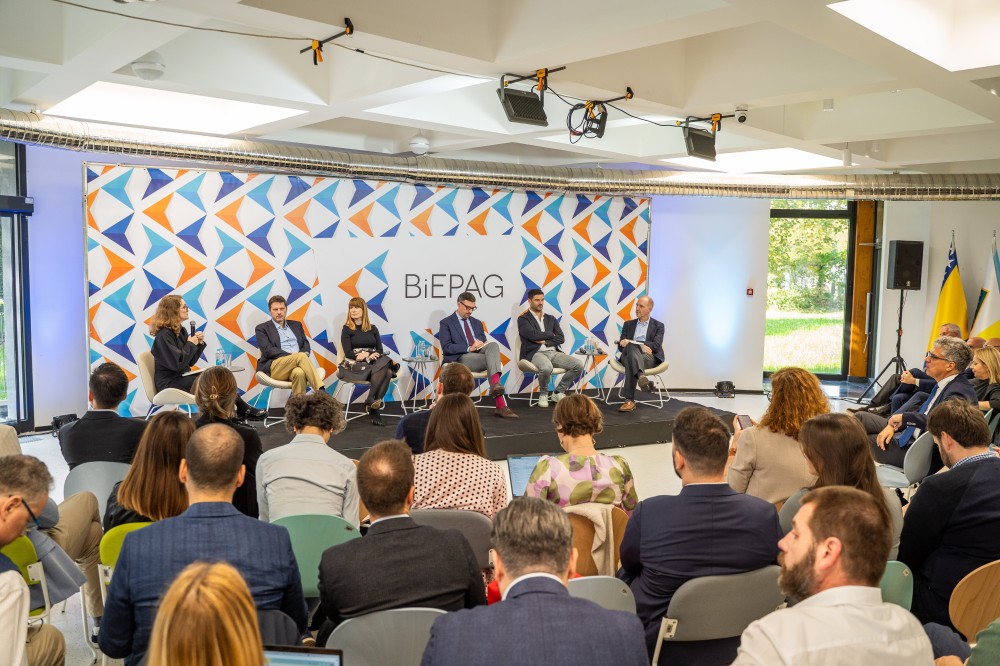
The Balkans in Europe Policy Advisory Group (BiEPAG) is our unique initiative of researchers and analysts from the Western Balkans and Europe, dedicated to the European integration of the countries of the Western Balkans and the consolidation of democratic and open societies in the region.
The group was formed and promoted to the public for the first time in Sarajevo in 2014 as a joint initiative of the European Fund for the Balkans (EFB) and the Center for Southeast European Studies at the University of Graz (CSEES Graz). This year BiEPAG marked its 10th anniversary of active work and efforts to bring the region closer to the EU and support the capacity building for EU membership with a one day conference back to where it all started - Sarajevo.
For BiEPAG, European integration is not only a goal in itself, but also one of the tools for achieving democracy, prosperity and stability in the Western Balkans. BiEPAG understands that the integration of the region in the EU is a project of central importance, that needs to be complemented with a number of processes, initiatives and actors that contribute to securing these goals within the countries of the region.
- Over the past decade, EU enlargement in the Western Balkans has been serious crisis. Multiple challenges in the EU and the stagnation and decline of democracy in the region have undercut the process of bringing the six countries into the EU and resolving the open problems. While there has been some more movement in recent years, shaped by Russian war against Ukraine. Nevertheless, there not yet been a ‘Zeitenwende’ in the region and EU. The role of BiEPAG has been that of critical supporter of the process of EU integration. It has been critical in observing the rise of stabilitoracy, i.e. both the democratic decline and the encouragement this trend received from the EU and its member states. It has warned of the influence of autocratic global power in the Western Balkans and provided suggestions on how the EU can improve its enlargement process and develop innovative strategies to secure a democratic region in the EU, says BiEPAG's Coordinator Florian Bieber.
Over the past 10 years, BiEPAG has sought to advance its core mission through research, policy advice and advocacy. Through individual and collaborative work, BiEPAG members produce timely, critical and evidence-based research and policy advice, to later present all findings and recommendations to policy makers and the public through various meeting formats in the region, European institutions in Brussels and member state capitals EU.
BiEPAG members have been directly or indirectly involved in all processes related to EU integration and democratization of the region from the very beginning, contributing with their proposals within the Berlin Process and the Civil Society Forum (as coordinators of working groups on bilateral disputes, and on our initiative and in accordance with our proposals, the Resolution on Bilateral Disputes was adopted in Vienna in 2015. year). They have prepared over 50 practical policy proposals and actively advocated for the recommendations from those analyses, some of them, such as the inclusion of the Western Balkans in the instrument for the rule of law, were accepted.
- Within BiEPAG anniversary activities, we have asked all members what BiEPAG means to them and I liked what is behind the statement of our member Srdjan Cvijić. He said that BiEPAG „empowered experts from the Western Balkans and removed a kind of neo-colonial bias from the expertise about the region.“
If we have contributed to emancipate expertise and knowledge from the region and helped voicing them – we can be satisfied with the results of BiEPAG so far - Aleksandra Tomanic, Executive Director of the European Fund for the Balkans.
BiEPAG will continue to promote diverse perspectives and is committed to debate, both among its members and with others, based on the fundamental goal of securing a democratic and prosperous future for the region. BiEPAG supports an inclusive and functional democracy, based on the rule of law, a vibrant and critical civil society and media, and the protection and promotion of vulnerable and marginalized groups and individuals.








